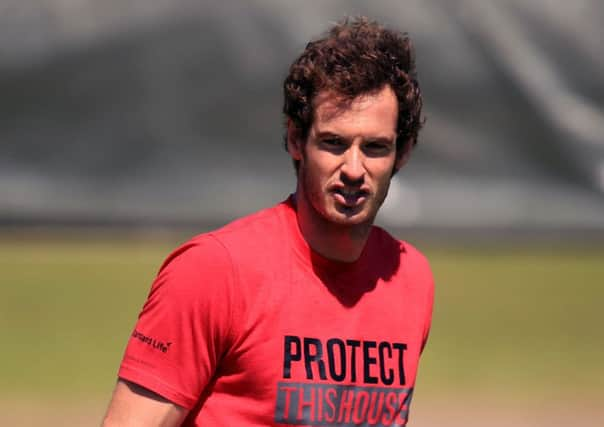Wimbledon: Winner Murray no longer in awe of anyone


This day in the Wimbledon calendar has become known as Sportspersons’ Saturday, and Murray has long since become an established star.
He is not the gangly, callow figure of 2005, with the black ankle support and boyish-looking cap on his head.
Advertisement
Hide AdAdvertisement
Hide AdHe is sinewy and strong, more comfortable in his skin and we are more familiar with his ways.
He is twice a grand slam winner; once he had pretentions, now he has intention.
Italian Andreas Seppi, who stands between the Scot and the fourth round, has not won a set in six consecutive defeats to Murray.
“His game is better than mine when he’s 100 per cent,” said Seppi yesterday. “That is why he won the last matches.”
Advertisement
Hide AdAdvertisement
Hide AdHe did not sound as though he was overdosing on confidence. He has beaten Murray once, in Nottingham nine years ago.
“Too many matches, too long ago,” replied Seppi, when asked whether he could use that memory to inspire him today.
The Murray of 2005 had yet earn his place in the pantheon of British sports stars, several of whom will today settle into seats normally occupied by members of the royal family and television celebrities, the modern aristocracy.
In the recent past, those such as Sir Bobby Charlton and England rugby World Cup winning captain Martin Johnson have been invited to take in the action from this prestigious vantage point. Several 2004 Olympic gold medallists looked on when Murray tackled Nalbandian a decade ago. How does Murray compare the demands of tennis with those of other sports?
Advertisement
Hide AdAdvertisement
Hide Ad“My speed on the tennis court is because I am quick over two or three metres, or changing direction,” he said.
“But over a 50m or 100m race I am not going to be particularly quick in comparison to some football players or some rugby players – anything like that.
“But I suppose we are used to being very versatile. There are a lot of different skills that you have to train in tennis in terms of the strokes – forehands, backhands, serves, returns, smashes, drop-shots.
“There are different spins, different surfaces – you are not playing on the same surface every time. And then there are different opponents every couple of days, which can be challenging tactically.”
Advertisement
Hide AdAdvertisement
Hide AdMurray’s point is that tennis is a sport that deserves to be respected, particularly in this febrile, intense environment of a grand slam.
He has no reason to feel in awe of anyone any longer. At his first Wimbledon, he remembered being cowed whenever Tim Henman and Greg Rusedski came up to talk to him, wondering why they would want to speak to him.
Now he is the mentor, one whose help and guidance has been mentioned on numerous occasions by British players this week. Murray just shrugged when this was put to him, as if to say ‘of course, I’m there to help. Who wouldn’t?’ And it is not simply something he regards as a patriotic obligation.
“I’m not just doing it to say I really want to help them, I’m doing it because I’m friends with them, I get on well with them, they’re people I like,” he said.
Advertisement
Hide AdAdvertisement
Hide Ad“I genuinely care whether they win or lose the matches. The relationship is kind of different with all of them [the British players here], I would say.”
Britain’s James Ward has made it into the top 100 courtesy of two victories here this week.
“It is not an easy thing to do,” acknowledged Murray. “For me, I don’t like saying that it is great that Jamie makes the top 100. What is great is that he reaches his potential against what his potential is.
“Not everybody has the capabilities to get to the top 100, but James really has the capability. And you want to see him reach his potential, which he is getting close to doing.”
Advertisement
Hide AdAdvertisement
Hide AdMurray hit with Ward yesterday on the practice courts at Aorangi, and while his affection for his fellow Briton is genuine, there are pragmatic reasons for playing with him; it means they can steal an extra hour of practice time (each player is allocated 60 minutes).
It was not hard to spot the player with the real prospect of emerging champion here; Murray’s backroom team stretched almost into double figures, while Ward was accompanied by a single adviser, coach Darren Tandy.
Thanks to Ward, who takes on Vasek Pospisil, not all eyes will be on Murray, as they were on the equivalent day in 2005. But unlike 10 years ago, the Scot knows failure is not now an option. The mentor needs to deliver.